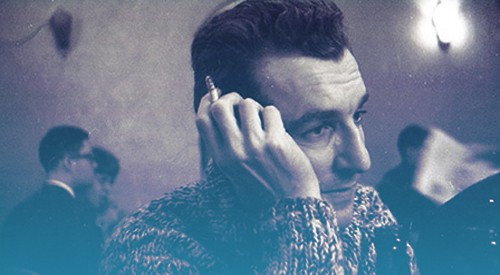Books & Culture
The Purity of Something I Do Not Know: On John Wieners’s Selected Poems and Selected Journals

One of the best classes I took in grad school was a poetry seminar, a course on first books, taught by the poet Paul Violi. His erudition vast and casual, his old-school New York Cool matchless and without affectation, just being around Paul — who died in 2011 — was like a second grad seminar on top of the one he was giving. One of the books we read in that class was John Wieners’s The Hotel Wentley Poems, at that time out of print, and maybe trapped in some kind of copyright limbo — he may or may not have explained it to us, accurately or at all — but the upshot was that the book could not be ordered through the usual channels. That was not going to stop Paul from teaching the class he wanted to teach, so one week we each gave him ten bucks and he came to the next class meeting with a manila envelope stuffed full of copies of a staple-bound bootleg chapbook edition of Hotel Wentley, credited to Joy Street Press, named for the Boston street Wieners had lived on. Paul didn’t make this book; he just knew where to get it. There was a black-and-white photograph of a young Wieners (by the artist Wallace Berman) on its cardstock cover, and on the back a blurb from Frank O’Hara, pulled from his poem “Les Luths,” in which he’d written “Everybody here is running around after dull pleasantries and wondering if The Hotel Wentley Poems is as good as I say it is.”
It is.
In an impressively compact introduction (composition, publication history, reception, and after-life are crammed into five paragraphs) the Joy Street editor explains that “this edition is for all those poets and fans of Wieners who want these poems on their own but cannot afford the increasingly expensive first and second editions of this book.” That was 2006.
This year, happily, saw Wieners back in bookstores and affordable for the first time in a literary generation, with the publication of two major collections from two of the country’s best independent poetry houses. In September, City Lights published Stars Seen in Person: Selected Journals, edited by Michael Seth Stewart. A month later, Wave Books published Supplication: The Selected Poems of John Wieners, edited by Joshua Beckman, CAConrad, and Robert Dewhurst. The coordinated appearance of the volumes should bring fresh — and long overdue — attention to Wieners, a kind of blank spot on the map that charts the course from the late Beats to the New York School. From “A poem for cock suckers:”
It is all here between
the powdered legs & painted
eyes of the fairy
Friends who do not fail us
Mary in our hour of
despair. Take not
away from me the small fires
I burn in the memory of love.
Written in six days in June of 1958, in a borrowed room in the titular hotel in San Francisco’s Western Addition, Wieners was close on the heels of both Ginsberg’s Howl (1956) and O’Hara’s Meditations In An Emergency (1957), as well as Jack Spicer’s After Lorca (also ’57). I could say more about The Hotel Wentley Poems but I won’t, because suddenly — finally — there’s so much fresh ground to cover, so much to discover and explore, which is what I’ve been doing for months now, and invite you to do as well. “I had a fellowship, but lived poorly / On slices of pizza,” Wieners writes in a self-mocking late poem called “Charity Balls.” That fellowship, I’m inclined to believe, was a Guggenheim. The poem concludes: “I’m curt by nature and dolorous. / But I knew if I worked hard I’d eventually make it.”
In “The Lanterns Along the Wall,” a prose-poem, Wieners tells us, “Poetry is the most magical of all the arts. Creating a life-style for its practitioners, that safeguards and supports them.” The piece is an ars poetica in the vein of O’Hara’s “Personism: A Manifesto,” which it matches for passion if not exuberance. Well why should it? The aforementioned Guggenheim notwithstanding, Wieners lived most of his life without much safety or support, as he battled addiction, mental health issues, and poverty — none of which he ever fully overcame. In a way it’s astonishing that he lived as long as he did, and that so much of his work has survived to be collected here. That fact is owed to the diligence and care of a small circle of friends and intimates (the Joy Street pirate not least among them) and I don’t want to get lost in the weeds of autobiography, so suffice for now to say that when Wieners wrote that poetry creates a “lifestyle for its practitioners,” his thinking was either aspirational or ironic, or else referred to something far less corporeal (but surely no less essential) than the material conditions of existence, that is, one’s life as it’s actually lived.
In lieu of O’Hara’s militant good cheer we encounter an astringent mysticism — less hermetic than Spicer’s, though it owes something to him. They knew each other and battled many of the same demons. Spicer taught a class in San Francisco called “Poetry as Magic.” That was also in ’57. Wieners didn’t take it, but I can’t resist mentioning that both Robert Duncan and Jack Gilbert did. Wieners’s poem “Hotel Blues” is an elegy for Spicer — who died in 1965, alcoholic, 40 years old — though I don’t think the hotel in question there is the Wentley, and anyway you’ll find two versions of it in the Journals, not the Poems.
Supplication is, and Stars Seen in Person is, an abundantly rewarding book, a treasure-house of occult desperation and wonder; a rage against life that somehow hungers for more life. Each book is this individually and the both of them are together.
Supplication, in classic Wave style, is a work of understated panache. The table of contents is ordered chronologically by date of publication of the original collections. (Within each book it tends to jump around, which you can see happening because Wieners habitually dated his poems, and those dates are preserved here.) There are no section headings or divisions within the book itself, however, so it’s not necessarily clear which book you’re reading, or when you’ve gone from one to the next. There is a bibliography and an index of titles and first lines, but no biographical essay or introduction. There are no footnotes. The editors invite you to forget about eating your poetry-spinach, forget the portent of a “selected poems” by a “neglected master,” and just read the thing.
Burn a small fire. Fall in love.
Of course Wave’s approach might not be so easy to love if not for the existence of Stars Seen In Person, the more traditional yin to its puckish yang. Editor Michael Seth Stewart presents four journals Wieners kept throughout the 50s and 60s. His substantive introduction, and Ammiel Alcalay’s heartfelt preface, gives you ample literary, personal, and political context — everything you could ask for, short of a proper biography, which who knows if we’ll ever get.
It would be a mistake to view the journals as ancillary to the Selected. At least two were written with an eye toward eventual publication, and there’s a lot of poetry to be found in them, though for me the prose is really where it’s at. There are terse and spiky apothegms abounding:
“I shall try to burn away reality, I shall piece out the dross and try for the purity of something I do not know.”
“It is right to stamp aside the enemy, but friends must be endured, no matter what cost, as they are few, and others so many and powerful.”
Would that the former were written on the gates of every writing workshop, and the latter on the doorposts of every bar within a five mile radius thereof.
There are also great flowing unparagraphed blasts of emotion, infused with Wieners’s quintessential, paradoxical yearning for physicality and disappearance, carnality and self-erasure. For him the question was not “to be or not to be,” but rather, why does it have to be an “or” and not an “and.”
He lived his question for 68 years. But these lines below are from a journal he began when he was 20, bearing the pointedly brash and bashful title, The Untitled Journal of a Would-Be Poet. It’s one for the road:
“I knew nothing of what I wound find, the mystery of a world outside of the downtown Washington Street shopping center a world where I would know no one, where every shadow on a street corner was god, where bright, glistening women in white dresses went in and out of hotels all night long never let me rest in familiar patterns again. Neon lights made every face a face. Every eyebrow was remembered. I could tell how eyes would look at me. I would not let a face go by but I would tear into it until I made its eyes look into mine. Shadows were real, footsteps became men, laughter was white wine running down my throat. I did not want to laugh, I only wanted to hear laughing. I did not want to know what all the gaiety and the shouting was about, I only wanted genuine headless laughter running in my ears. I wanted bright faces not up against mine, I only wanted to watch bright faces go by. The widest streets I walked the most. Here I was freer.”









